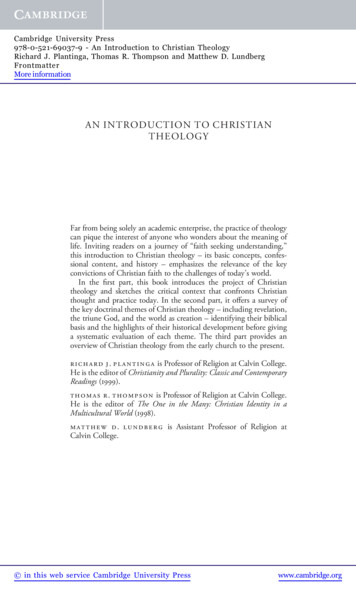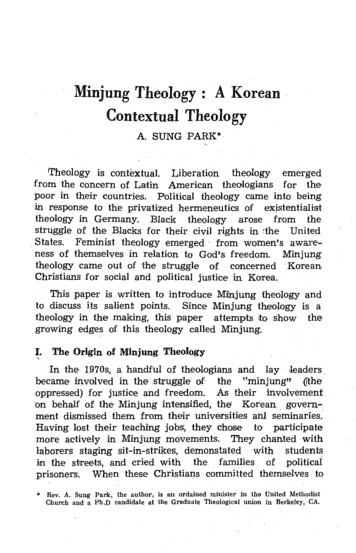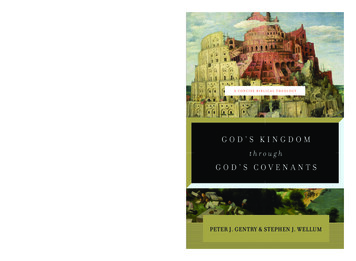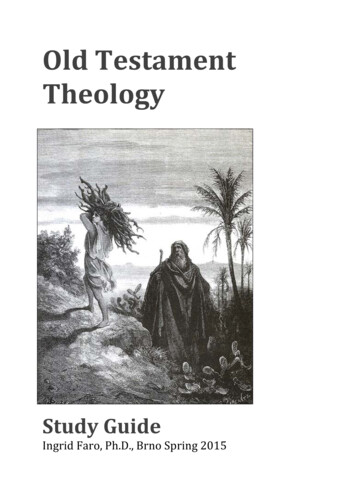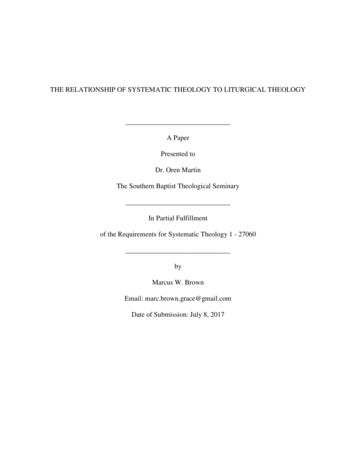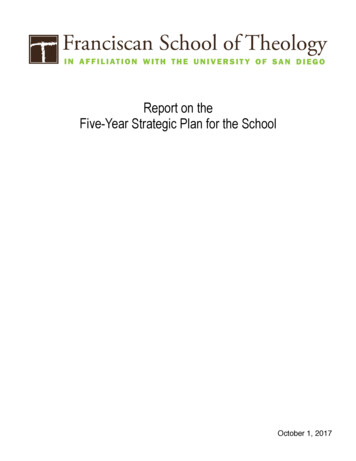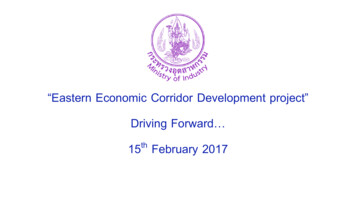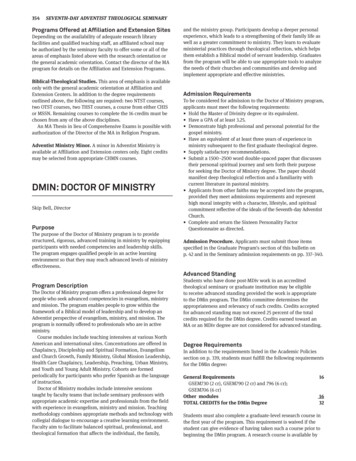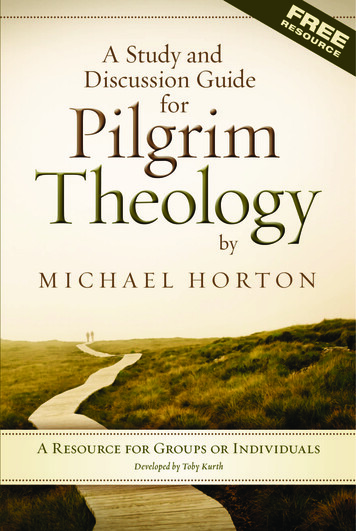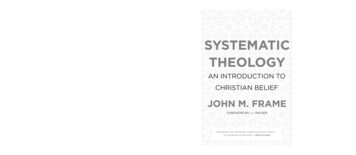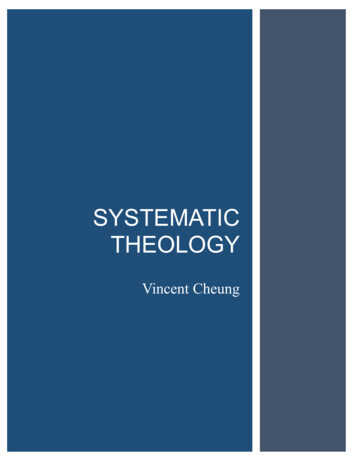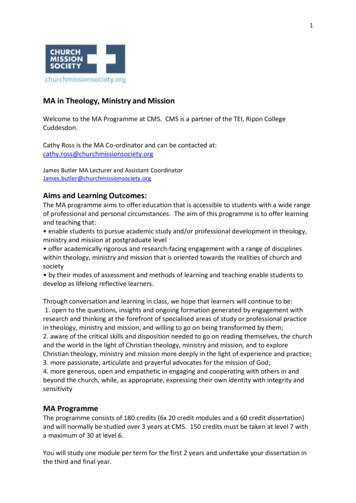
Transcription
1MA in Theology, Ministry and MissionWelcome to the MA Programme at CMS. CMS is a partner of the TEI, Ripon CollegeCuddesdon.Cathy Ross is the MA Co-ordinator and can be contacted at:cathy.ross@churchmissionsociety.orgJames Butler MA Lecturer and Assistant ms and Learning Outcomes:The MA programme aims to offer education that is accessible to students with a wide rangeof professional and personal circumstances. The aim of this programme is to offer learningand teaching that: enable students to pursue academic study and/or professional development in theology,ministry and mission at postgraduate level offer academically rigorous and research-facing engagement with a range of disciplineswithin theology, ministry and mission that is oriented towards the realities of church andsociety by their modes of assessment and methods of learning and teaching enable students todevelop as lifelong reflective learners.Through conversation and learning in class, we hope that learners will continue to be:1. open to the questions, insights and ongoing formation generated by engagement withresearch and thinking at the forefront of specialised areas of study or professional practicein theology, ministry and mission, and willing to go on being transformed by them;2. aware of the critical skills and disposition needed to go on reading themselves, the churchand the world in the light of Christian theology, ministry and mission, and to exploreChristian theology, ministry and mission more deeply in the light of experience and practice;3. more passionate, articulate and prayerful advocates for the mission of God;4. more generous, open and empathetic in engaging and cooperating with others in andbeyond the church, while, as appropriate, expressing their own identity with integrity andsensitivityMA ProgrammeThe programme consists of 180 credits (6x 20 credit modules and a 60 credit dissertation)and will normally be studied over 3 years at CMS. 150 credits must be taken at level 7 witha maximum of 30 at level 6.You will study one module per term for the first 2 years and undertake your dissertation inthe third and final year.
2MA ModulesThere are 6 modules that you will study over 2 years as well as an annual MA weekend.(NB the order may vary)The modules are:YEAR 1Anthropology and Christian Mission (TMM3461)A course designed to introduce students to culture, context and worldview. Students will developtheir own reflexive capacity in relation to their own cultural background and behaviour.Reflective Practice: Leadership and Collaboration (TMM43320)A course designed to enable students to discern appropriate models of leadership and evaluate theirown experience in leadership. Material is drawn from both secular and Christian contexts.Reflective Practice in Mission and Evangelism (TMM43520)A course designed to help students gain a solid grasp of missiology and to engage with currentmission issues through exploration of themes and metaphors. It will also help students to reflectmissiologically on their own context and experience.YEAR 2Missional Ecclesiology (TMM2451)A course designed to help students reflect on the role and mission of the church both historicallyand in the contemporary world bringing their own experience into conversation with variousperspectives.Research and Reflection: Resources and Methods (TMM42220)A course designed to introduce students to various research methods and approaches to theologicalreflection. There will be an opportunity to design a research project.Theologies in Global Perspective (TMM42620)A course designed to help us engage in theology in the current global context by examining globalperspectives on our Bible, faith and mission.YEAR 3Dissertation (TMM42360)This is completed in the third year of study. It is a piece of work of 12-000-15,000 words enablingthe student to follow an area of interest in depth.EXTRA MODULESYou can audit other undergraduate modules at no extra cost such as the Mission Entrepreneurshipor Bible in context weeks.You can find more detailed information and a short reading list for each module on the CommonAwards website where generic module descriptors are dules/outlines.titles/
3Course Outlines and AssessmentCourse Outlines with dates of classes and assessment are available on Moodle.There will be both formative and summative assessment.Normally formative assessment will happen during the term. Formative assessment isungraded and is designed to test your interim learning and to give you helpful feedbackduring the course.Summative assessment will be due in either at the end of term or the beginning of thefollowing term. These may be in the form of essays, journals, portfolios, visit reports, projectproposals etc. There are normally two pieces of written work per module and you areexpected to write around 2-3000 words for each piece.NB It is important that you keep to deadlines in order for marked work to get to the correctExam Board for moderation.Official submissions go through RCC Moodle, via CMS Moodle. The deadline is always 12noon on the advertised date. All submissions must have a completed cover sheet attached.(see separate guide)Also, email submission to assignments@churchmissionsociety.org by 12 noon on deadlineday.Attachments in both cases must be ONE document in pdf format.Module code student number essay or portfolioe.g.Document named ‘TMM1111 00012235 essay (or portfolio)’Email subject Line ‘TMM1111 00012235 essay (or portfolio)’Header or footer ‘TMM1111 Module Name 00012235’Attendance and ProgressionAll registered students are expected to: (a) fulfil the attendance requirements of the TEI: theexpectation is 100% unless permission for absence has been sought from the module tutorin the first instance; and (b) fulfil all academic engagements (including registration, writtenwork, tutorials, seminars, practical classes, placements, short courses, including those whichmay be held during vacations) to a standard satisfactory to the Programme Leader.Assessment ScheduleThe assessment for each core module has two stages: formative assessment (i.e. learningduring the module where explicit feedback is given) and summative assessment (i.e. wherea final and moderated percentage mark is assigned by the module tutor). Module tutors willalways aim to provide feedback within one calendar month of the published submissiondate. The marks of the summative assessments will be processed through an ExaminationBoard, which meets at two periods of the year: Exam Board 1 in June-July (i.e. remaining
4work needs completing during the Easter vacation period) and Exam Board 2 in SeptemberNovember (i.e. remaining work needs completing during summer’s Long Vacation). Theclassification of an individual student’s results will be processed at the Examination Boards,whose conventions will be subject to Durham University’s Core Regulations.Late SubmissionsSummative assessed work submitted late but within five working days of the deadline shallbe penalised by having the mark capped at the module pass mark (40%). The work willnevertheless be marked and feedback supplied. The mark that would have been awardedwill be indicated to the student. Here a ‘working day’ refers to Monday to Friday, andexcludes all statutory bank holidays.Summative assessed work submitted more than five working days after the deadline will notbe marked and a mark of zero will be recorded. A student who is unable, due to illness orother good cause, to submit coursework by the required date may apply to the ProgrammeLeader or his/her nominee for an extension of that date. This should normally be done inadvance of the deadline. If granted, a new date will be set as appropriate.Academic malpracticeThe TEI considers academic misconduct to be a formational and disciplinary matter; it mayresult in expulsion without the award of a qualification. Such malpractice may take the formof: plagiarism (unacknowledged quotation or close paraphrasing of other people’s writing,amounting to the presentation of another person's thoughts or writings as one’s own),multiple submission (inappropriate submission of the same or substantially the same workof one's own for a different module), collusion (working with one or more other students toproduce work which is presented as one's own in a situation in which this is inappropriate ornot permitted and/or or without acknowledging the collaboration); impersonation(presenting work on behalf of someone else as if it were the work of the other individual);cheating (using inappropriate or unauthorised means to achieve credit for a module); theuse of inadmissible material (which is not permitted to achieve credit for a module); andsubmitting work purchased from an essay writing website, as if it were your own work.Therefore, you should take care to acknowledge the work and opinions of others and toavoid any appearance of representing them as your own. If you need further guidance or ifyou are struggling with your academic work then please consult with the Module Tutor,Programme Leader and/or the Study Skills Officer.ResourcesAll of the general information you will need for this programme will be available on the CMSMoodle site.Students on this programme have user rights for books and journals held in the collegeLibrary (c. 30,000 volumes). Students have user rights for Durham University onlineresources: JSTOR (Journal Storage), a major digital library of academic journals, books, and
5primary sources, and ATLA (The American Theological Library Association), a premier indexto journal articles, book reviews, and collections of essays in all fields of religion.SupportSarah Clarke co-ordinates the student support so do talk to her if you have any questionsabout it. There is a section on Moodle with several sections so do look through theinformation on there.To help guide your progress through the MA programme, you will be assigned a tutor fromthe CMS team to help support you during your studies. You'll find out who your tutor is atour Induction day and this person will stay supporting you throughout your time with us.Ordinands will also have a tutor at Cuddesdon.Twice a year, your tutor will get in touch to arrange a meeting (usually on a Tuesday). Thismeeting is about hearing how you're doing, what your progress is and anything we can do tohelp your studies. It's also a chance to talk about how you're doing in yourself, how thingsare in your context and to check that you're happy and content. These meetings areinformal in nature so there's nothing to worry about. Tutors will take some personal notesbut these are kept private and things are kept confidential unless you as the student agreesor in very unusual circumstances where some wider action needs to take place. Tutoring isabout investing in you as students. Make best use of these times and be honest with yourtutor as they support you.Each student will also have a mentor - this is someone in the local context who can play asupporting role while you are on the course. There are two roles that we hope the mentorcan play for the student. One is to be a source of support and encouragement as you do thecourse. The other is to be someone who you can talk with about the specific task of puttingtogether the portfolios.We also have a course chaplain – Rev Idina Dunmore – who has kindly offered to be presenton most Tuesdays to offer a listening ear/encouragement/pastoral support.If you know that you suffer from dyslexia, or suspect that this might be the case, then pleasespeak to your tutorStudent FeedbackStudents are registered during the first term through the TEI as members of DurhamUniversity. The Programme Leader sits on the termly Common Awards ManagementCommittee (which reports to Durham University’s Common Awards Management Board) onwhich you are entitled to student representation for these programmes. There will also beopportunity for student feedback at the RSC Board of Studies, when the delivery of theprogramme and its modules is reviewed. If you have a complaint then it is always best toresolve the problem quickly and informally, but if this is not possible then please readthrough the Student Complaints Procedure on the VLE which provides further advice andinstructions.
Official submissions go through RCC Moodle, via CMS Moodle. The deadline is always 12 noon on the advertised date. All submissions must have a completed cover sheet attached. . There is a section on Moodle with several sections so do look through the information on there. To help guide your progress through the MA programme, .
